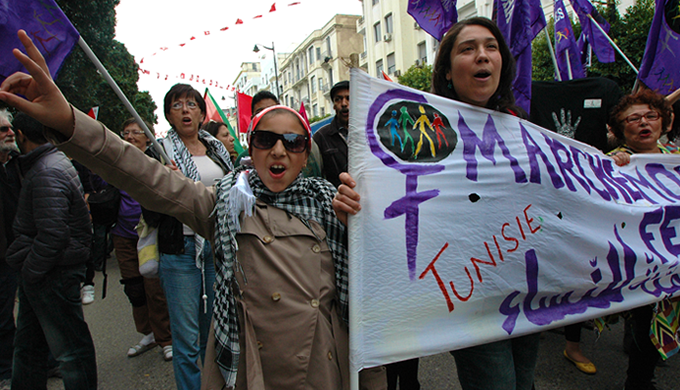Where better to learn about how to bring people together and have a profound impact than Tunisia? Tunisia’s social movements made history, not only through their own successful democratic revolution against dictator Ben Ali; but by inspiring and sparking the fights for democratic rights and economic justice throughout North Africa and the Middle East that became known as the “Arab Spring.” Even Occupy Oakland, the largest movement work that Causa Justa :: Just Cause has been part of in years, was tiny and tame compared to the scale of mobilization, militancy, and impact the movement has had in Tunisia.
Alma & I compared notes, sitting on the lawn during the opening ceremony of the WSF. Having both been involved in the Black and Brown unity merger that formed Causa Justa :: Just Cause, we are no strangers to unity-building and convergence. The long opening march of the Forum had just concluded as the sun set. We reminisced about the last time we had marched as many hours, with that many people, while watching the sunset: when Occupy Oakland shut down the Port of Oakland on November 2, 2011. We marveled at the fact that here we were, listening to speeches in Arabic, French, and Portuguese, declaring some of the same things we heard at the port: “The system is rigged! War is the enemy of the poor!”
I was a bit star-struck to meet the unbelievably brave social movement Left of Tunisia. They were everyday, ordinary people, who took humongous risks, and made historic, extraordinary change. “Did you march down this street when you were fighting Ben Ali?” I asked Yousra, a young Tunisian woman marching next to me at the WSF opening march. “Oh…many, many times” she answered, “This is our Tahrir Square; we came here every day.” I asked her to tell me more, but instead of recounting the glory days, a melancholy look flickered over my new friend’s khol-lined eyes. “Now I can vote. But I have no one to vote for.” She looked right and left to see who was in earshot. “Chokri Belaid. We would all like to vote for him. Now that he has been killed, we have no one to vote for.”
A longtime community organizer and human rights lawyer, Belaid represented the Tunisian Left’s aspirations for social and economic justice. Belaid was the coordinator of the Popular Front, an alliance of twelve progressive political parties who came together to consolidate the various tendencies of the previously divided Tunisian Left in order to compete more effectively in the upcoming elections. He was uniting the Left. He was the progressive social movement’s most viable candidate. And he was assassinated shortly before the Forum.
His shocking murder and the World Social Forum took place in the context of a fierce fight over the legacy of Tunisia’s “Jasmine Revolution.” Under dictator Ben Ali, both the secular Left and the Islamist Right, were highly repressed. Both had their political parties banned and much of their leadership languished in prison or exile for decades. When the Tunisian people won the revolution and Ben Ali fell, the victory of expelling the dictatorship also created a power vacuum. The money and the politics of the Saudi and Qatari 1% flooded the country, propping up the Islamists and propelling a formerly banned Islamist party called Ennahda into power. The well-resourced Islamists are claiming the revolution belongs to them.
Ennahda, originally inspired by the Egyptian Muslim Brotherhood, is considered a moderate Islamic party today. But Tunisian Leftists say Ennahda is creating space for fundamentalist Islamists (often referred to as Salafists) to carry out violent attacks on secular society and build their base. Ennahda has downplayed their economic agenda, which seeks to accelerate neoliberal economic reforms like privatization and eliminating the social safety net. Just this last week they agreed on a deal with the IMF for a loan of almost 2 billion US dollars. This loan, of course, has neoliberal strings attached. As Rob Prince puts it in his article Tunisia’s Salafists, “Strangely, during the Ben Ali years, Tunisia was put forth as a poster child for IMF structural adjustment programs, programs which helped undermine the country’s economy and trigger the uprising. In the post Ben Ali period, Tunisia is again being held up as a model!! – this time a model of transition (but from what to what?)”
The Tunisian Left now has to contend with a party in charge that support neo-liberal economic policies and US strategic interests in the Middle East and Africa, and creates space for fundamentalist Islamists who want to put in place severe restrictions on the rights of women based on an ultra-conservative interpretation of Islam.
Meanwhile, the most active elements amongst the social forces that overthrew Ben Ali were many first-time progressive youth activists, along with the surviving remnants of political parties of the Left. What many in the US are surprised to learn is that although a majority of Tunisians are Muslim, the progressive movement is solidly (and militantly) secular. A common slogan aimed at the Islamist government who claims to “govern on behalf of God” is “Govern for The People!”
There are other social elements as well. People have seen how the US uses negative stereotypes and racist ideas about Islam to justify military intervention, oppression, and exploitation of societies that are predominantly Muslim. Many Tunisians understandably react to that by rising up in defense of their culture. This cultural opposition often lacks a fully formed political vision, and without clear positions against the oppression of women, it becomes a ripe ground for recruitment into Islamist tendencies.
But cultural opposition can also lead towards a coherent progressive vision, if it is informed by Left nationalism, feminism, and a strong underpinning of economic justice. There are deep connections to make between struggles for self-determination, and the fight for women’s rights.
A Senegalese social movement leader made those connections at the WSF women’s assembly: “Colonialism excluded us from democratic rights over our land, over our bodies, over our future. After direct colonialism, economic colonialism kept corrupt dictators in power all over our continent.” She shook her fist from the podium of the packed room. “Anyone who says they want independence from colonialism, but wants to marginalize women, and exploit women workers is carrying out the legacy of colonialism!” The crowd roared in support, and chanting broke out in French: “Sol! Sol! Sol! Solidarité! Avec les femmes du monde entire!” (Solidarity with all the women of the world!).
The conversation about women’s rights continued throughout the forum. Late night political debates raged about how best to confront the neoliberal transformation afoot, shrouded in the name of religion and tradition. Over green-tinted bottles of watery Celtia lager, deeply committed pro-democracy activists revealed their deepest fears: had overthrowing Ben Ali improved things? In a country where grinding poverty was uncommon, where social safety net programs existed, and where equal pay for equal work was written into the constitution since the 50s, had the political space opened by the revolution served a progressive agenda, or had it become an opening for the fundamentalist right wing to take over?
I heard from progressive Muslims about the way their faith and culture were being manipulated and distorted. I could relate – in the US, the right-wing Tea Party makes the Bible sounds like the gospel of Margaret Thatcher, and sometimes it feels like the right wing has taken out a patent on Christianity that no one is able to break. I started to understand just how difficult the situation is for progressives in Tunisia, North Africa, and the Middle East. I began to appreciate how the “shock doctrine” was playing out. How in the midst of political instability, corporations and their advocates were rushing in to restructure the economy of Tunisia and rig it in their favor. And the role conservative Islamists were playing in propping up those economic changes. The Women’s Dynamic process at the forum captured a collective analysis of this and the broader picture of women’s oppression and exploitation on a global level, in their final declaration. Thee core themes were: neoliberal austerity, wars of empire, and fundamentalisms. Meanwhile, despite it’s rhetoric about women’s rights, the US has perpetuated war and occupation throughout the region, and been nothing but supportive of the Islamist government in Tunisia, concerned only about profit via neoliberal economic policies.
“Feminists Unite! Women’s Rights in the Age of Empire”, the formal session that GGJ and the World March of Women organized, revealed even more about the challenges the women’s movement faces in Tunisia. We heard from Suheir, a veteran feminist organizer fighting to maintain Tunisia’s profoundly progressive policies on women’s rights in the new constitution. She described a “curious alliance” between neoliberal capital and Muslim fundamentalists, where women ultimately pay double the cost, losing ground both on social and economic levels. She challenged feminists from the global north to reject the US narrative that claims that democracy requires free trade, and to confront US militarism and intervention in the Middle East and North Africa. In learning directly from Tunisian feminist organizers, we started to build the peer-to-peer grassroots relationships that Internationalist Feminism depends upon. A student leader named Sham shared the vision of the youth who participated in Tunisia’s revolution. “We want a society based on equality, social justice, and economic justice,” she said. “Feminism that doesn’t embrace the struggle for economic justice, that does not address questions of class, is just an embellishment added to a picture that doesn’t fundamentally change. That’s not what we fought for, that’s not what people died for in the square.” The session also highlighted what is so unique about the forum. When Tunisian women paid tribute to Chokri Belaid’s militant feminist widow, South African women broke into song to pay tribute! Where else would such an exchange be possible, except the World Social Forum?
My experience at the WSF gave me a deeper understanding of the challenges looming for the progressive movement, and for feminists in particular, in Tunisia and in the whole region. The Social Movements Assembly declared “we are at a crossroads where retrograde and conservative forces want to stop the processes initiated two years ago with the uprisings in the Maghreb-Mashreq [North Africa & Middle East] region that helped to bring down dictatorships and to challenge the neoliberal system imposed on the peoples. These uprisings have spread to all continents of the world inspiring indignation and occupation of public places.” As inspiring and outgunned as David facing Goliath, progressives in North Africa and the Middle East have no choice but to fight, despite the odds stacked against them. The Tunisian social movements hosted the forum as a strategic move to gain space for the Left, to challenge neoliberal globalization, and to build common cause with people from the rest of Africa, and all over the world. Halima, a forum organizer and women’s movement leader summarized the forum in a very personal way. “After losing Chokri, we didn’t know if we could go on. Now that everyone has come here, we know we are not alone. We must continue to fight!”
Like Tunisia, the World Social Forum is also under construction. It is just the beginning of a process of becoming a more coherent, progressive, and global “we.” This process ultimately needs to lead us towards joint action. The same banks that we at Causa Justa :: Just Cause confront alongside women trying to save their homes are the ones restructuring Tunisia’s economy in a way that impoverishes women. Our movements need to reach towards international scale and impact, so these connections and solidarity can take organizational form. The world’s 1% have their World Trade Organization, their World Bank, their agreements and coordinated plans. We, the global 99%, need that scale of functioning too. It’s the only way we can win the internationalist feminist change we need.
Below is a gallery of photos from our delegation. Photos by Josh Warren-White.
{gallery}World Social Forum 2013{/gallery}

